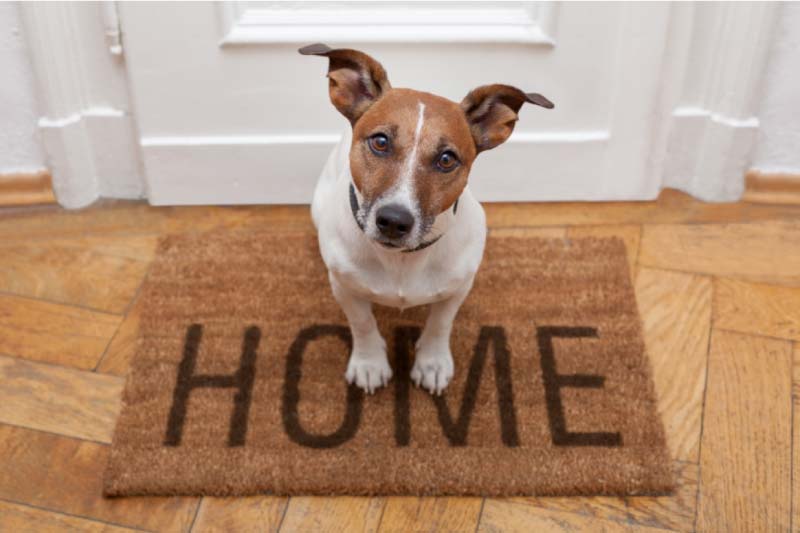Should I allow pets in my rental property?
Whether you have just bought a rental property, or are looking for prospective tenants, you will have to carefully decide on the pet policy in your rental agreement. Although you may be worried about the risk of damage, allowing pets in your rental property could actually be a savvy strategy for a wise investor.
In this month’s article, we explore the pros and cons as well as items of consideration, safeguards, and what to do if you suspect your tenant has unauthorised pets in your rental property.

Benefits:
Yes, animals can be destructive- but there are also many benefits of allowing pets in your rental property, such as:
A point of difference. Allowing pets for potential tenants can attract good and responsible tenants who feel locked out of most rental properties. It gives your property a unique point of difference.
Reduce turnover of tenants. Tenants who are pet owners can be less transient and more committed to their rental than other tenants because it can be difficult to find pet-friendly properties. Once you have good tenants in place they're less likely to leave on a whim.
Increase rental returns. The ability for tenants to own pets is an opportunity to increase your asking rent. You can make a slight rental increase as one of the stipulations for allowing pets in your property. Advertising a pet friendly property can also increase demand, allowing you to ask for more rent.

Concerns:
The most common concerns for landlords with pet friendly rentals are:
Damage to your property. Animals can scratch the floors, chew up carpets and have accidents on the carpets or wood floors.
Disturbing Neighbours. Dogs barking, birds squawking, and four-legged animals running around can disturb neighbours.
Liability. There is a risk of the animal biting other tenants or neighbours.
Pet Odours. Accidents inside the unit or in the building common areas will cause odour.
However, with the right safeguards in place, your property may be protected against these concerns.

How to safeguard your property:
If you do decide to allow pets, you'll want to make sure you have the proper procedures in place to safeguard your investment against a tenant's pet.
You should include specific sections in your lease agreement pertaining to pet ownership. It's important to stipulate that the tenant will be liable for any damage caused by the animals, and that they must fumigate the property when they vacate.
You can also specify in your rental agreement the types of animals you'll allow, for example you could stipulate that cats are permitted but that dogs are not, or you could enforce a weight limit on dogs. You can also consider a pet deposit.
You should discuss additional safeguards with your property manager and ensure their rental agreement also includes a section to individually list the details of any pets to be kept at the property. This can include the species, breed, weight and the animal's microchip number. These details could be vital should you have to file an insurance claim for any pet damage.
Your property manager should conduct regular property inspections to ensure the tenants are abiding by the terms set out in the rental agreement, and to identify any damage before it gets worse.
Considerations for allowing pets:
- What's the tenant's situation?
If you have purchased an investment property that has existing tenants who are pet owners, the decision may be a fairly easy one as your decision can be guided by the actual condition of the property. If they're a good, responsible and tidy tenant, odds are they'll be a good, responsible and tidy pet owner as well.
The decision becomes more difficult when you receive the request from a potential tenant. We suggest requesting written references from past tenancies with their pets and you could even discuss the situation with the property manager.
The tenant's personal circumstances are also an important factor. For instance, if the animal in question is a service animal, you cannot legally refuse the tenant's request.
- What type of pet?
It may assist your decision if you understand the type (cat, dog, rabbit, goat, etc.) as well as the breed (size, temperament), and age of the pet in question to see whether it is a good fit for your property. For example, a large dog may not be suitable for an apartment, but would be suitable in a large property with lots of outdoor space to roam.
You may also request your property manager to get the answers to the below questions:
- Is the pet left alone for long periods of time?
- What type of regular exercise does your pet get?
- Are they spayed or neutered?
- Who looks after the pet when you are away?
- Has your dog had any obedience training?
- Is your pet properly licensed?
- How do you control fleas?
- What type of property?
The type of investment property you own can largely dictate whether or not you should allow pets.
If you own a unit, the decision whether or not to allow pets may be out of your hands. Some strata bylaws prohibit pets of any kind. Others may allow pets only on a case-by-case basis, subject to approval of the owners’ corporation.
Even if your strata scheme allows pets, you'll need to assess the characteristics of the property itself. If it's a small unit with no balcony or without easy access to outdoor areas, it may be particularly unwise to allow certain pets or breeds.
- Your landlord insurance
Regardless of how responsible your tenants are, accidents with pets can happen. It is important to consider the level of cover of your landlord insurance policies and whether it covers damage caused by domestic pets (some policies may exclude this cover).

But what do you do if you suspect your tenant has an unauthorised pet on the property?
If property owners suspect a tenant is keeping pet’s on your property that are unauthorised, the first step is to contact the property manager so they can assess the situation.
Firstly, property owners should check the rental agreement to ensure the pet was not authorised in the tenancy agreement.
If the pet was not authorised, please request your property manager to inspect the property and discuss with the tenants the situation.
It is important to know the following:
- How long has the tenant had the pet for?
- Does the property have any animal smells inside?
- Is the tenant cleaning up after the pet?
- Is there any damage caused by the pet? (stains on carpet, scratches on doors, etc.)
- Where does the pet sleep at night and where is the pet contained most of the day?
- Is the pet trained and obedient?
- Does the tenant have specific reasons for wanting a pet? (e.g. single persons who want the company of a pet, single persons may feel safer with the pet, it may have been inherited from a family member, etc.).
It is important, as the landlord, to hear the tenants case out and understand fully the circumstances around the pet. In most cases, it is likely the tenant did not realise they had to seek permission to have the pet.

